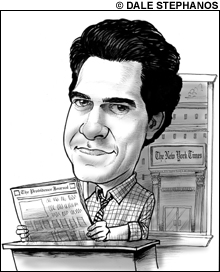 When a young Providence Journal reporter was poised to reveal the all-male membership of the Narragansett Lions Club last year, it didn’t sit well with at least one member. As the subsequent story recounted, Democratic Town Committee chairman Gene Wills visited the ProJo’s Wakefield news bureau and warned the scribe not to mention the absence of women, implying that doing so might cost him his job and diminish advertising for his employer.
When a young Providence Journal reporter was poised to reveal the all-male membership of the Narragansett Lions Club last year, it didn’t sit well with at least one member. As the subsequent story recounted, Democratic Town Committee chairman Gene Wills visited the ProJo’s Wakefield news bureau and warned the scribe not to mention the absence of women, implying that doing so might cost him his job and diminish advertising for his employer.
Wills probably didn’t know that the target of his message, Arthur Gregg Sulzberger, the 25-year-old son of New York Times publisher Arthur Ochs Sulzberger Jr., is part of a publishing dynasty that has faced requests to suppress information in matters ranging from the Bay of Pigs to the Pentagon Papers. (As it turned out, Sulzberger’s May 2005 piece on the Narragansett Lions, one of the largest such clubs in the country, highlighted the Lions’ considerable civic and charitable efforts, and didn’t mention the absence of women until the 16th paragraph.)

The Brown University graduate is just one of a number of talented young Providence Journal reporters in their 20s, many of whom, like their predecessors, will eventually move on to bigger papers and brighter destinations. The difference in Sulzberger’s case, of course, is that he might ultimately ascend to the top job at the New York Times. The chance to plow Rhode Island’s fertile journalistic terrain with such anonymity seems ideally suited for Sulzberger, a skilled reporter uncomfortable with public attention who has built a reputation as a well-liked, curious, hard-working, and unassuming young man. “The kid is not at all a prima donna,” says veteran political reporter Scott MacKay. “We’ve gotten kids here over the years with the same educational background, genius-types who think they know everything. He is really about making it on his own and being his own guy. You have to respect that.”
Family Times
As the direct descendant of four previous Times publishers (his great-great-grandfather was the iconic Adolph S. Ochs, who rescued the Times from failure and established its stellar reputation), Sulzberger was born to be in the public eye. His August 1980 birth to Arthur O. Sulzberger Jr. and reporter-turned-artist Gail Gregg was announced in the Times — in a story headlined SULZBERGERS HAVE SON — even though the paper had long since stopped publishing birth announcements (sister Annie was born two years later). As Alex S. Jones and Susan E. Tifft recount in The Trust: The Private and Powerful Family Behind The New York Times (Little, Brown and Company, 1999), “When the New York Post scored the Times for singling out a family member for special treatment, the Times countered that it considered the birth ‘news.’”
After a summer 2002 internship at the Times-owned Press Democrat in Santa Rosa, California, young Sulzberger graduated from Brown, where he concentrated in political science, and joined the Journal as a two-year reporter-intern in mid 2004.
In a move to shore up the ProJo’s staffing, he was among six reporter-interns whose jobs were made permanent when the intern program was suspended in January. He probably makes somewhere in the neighborhood of the $44,000 earned by a first-year Journal staff reporter.
Media critic Ben Bagdikian, who reported for the Providence Journal in the mid-20th century, recalls how some publishing families sent their heirs to the paper for seasoning, “because it was a place where people did a lot of shoe-leather reporting, covering municipal courts and municipal meetings, and having close supervision. It was considered a place where you would learn thorough reporting, because at that time, unlike the present, the Journal had 16 bureaus in the state of Rhode Island. We got neurotic if we missed a drunken-driving charge in Kingston.”
Despite years of cost-cutting measures, the Journal retains enough of its strong journalistic tradition to compare favorably with newspapers of similar size, and even some larger ones. So it should come as no surprise that the Brown graduate — whose father and paternal grandfather, Arthur “Punch” Sulzberger, cut their teeth at smaller papers away from New York — would alight there.
Reporter Tracy Breton, a member of the ProJo’s four-person investigative team, recommended Sulzberger for the paper after he impressed her as a student in the advanced feature-writing class she teaches at Brown. “He’s a very understated type of guy,” she says. “You wouldn’t know that he’s from the family that, you know, whose father is the publisher of the New York Times. He has this very nice way of talking with people and getting them to feel comfortable with him. He’s very curious about a lot of issues. He was hard-working as a student” — pursuing extra interviews for a pass-fail assignment, for example, when many of his peers were partying during senior week — “and I think he brings that into the work that he does at the paper.”